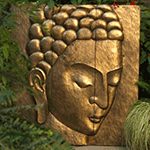Before long this body will die
and be left on the ground
like a useless log.
Dhammapada verse 41.
You look like a frog.
For ten years myself and my assistant teacher Henry, had the privilege to present ten day sitting and walking Vipassana retreats at the international meditation centre in Budh Gaya, India.
This is the town that has grown up around the Bodhi tree, where according to Buddhist tradition, the Buddhas awakening took place.
To be asked to present Dhamma and meditation by the Venerable Rastrapal, to mostly travelling westerners, in this special town was a great honour and a privilege we took very seriously.
We met many people, some of whom take a special place in my memory.
One such person was a young Italian woman who not only sat with us, but also helped with some of the organization. She called herself Lakshmi after the Hindu goddess of wealth, good fortune and beauty, and as teacher and student, we became quite close.
One day during the brief period between retreats as we were walking together through the small town, she stopped suddenly and asked, “do you know what first attracted me to you?”
At first I thought it must be because of my Dhamma reputation for clarity, joy and simplicity, but perhaps it was something else?
It is true that I had never thought of myself as having the stunning good looks of the then very popular cinema stars like Robert Redford or Paul Newman, but I never frightened children either, so I thought I was alright. Even so, her continuing comment came as a surprise.
“It’s because you look like a frog!”
The view we carry of ourselves is always something unique and particular to us individually. What we see when we look in the mirror is rarely what others see and how we feel about that reflection will support or oppose our feeling of confidence in life.
Ego, or attachment to a ‘self’ identity is very strong and if we base our understanding of life on physical appearance we are already in trouble as that appearance changes with mood, situation and of course aging.
So better not to be attached.
One of the reasons Buddhist monks have shaved heads and simple robes is to help bring about a cutting of the attachment to a presentation of ‘self’, and as well as the overall meditations of Vipassana and Metta Bhavana there are also other practices such as Paṭikkūlamanasikāra, the meditation on the unwholesome views of the body.
Once we let go of an attachment to self whether in its physical or mental form, we are free and even if someone thinks we are handsome or plain, interesting or dull it will not matter to us.
To resemble a frog in the eyes of another does not mean very much and is quite amusing at the surface level and a good Dhamma reminder to let go of any preconceived ideas of how the world views us.
The body and its appearance in whatever stage of its life, is nothing more than the vehicle for our awakening, beyond that, there is not much to say.
May all beings be happy.
*******
Koan:
The Master asked the student, “where have you come from?”
The student relied, “from the south.”
The Master asked, “how is Dhamma in the south?”
“There is a lot of discussion,” answered the student.
“But, how can that discussion compare to me planting vegetables to eat?” said the Master.
“Yes, but what can you do about the world?” asked the student.
The Master replied, “ what do you call the world?”
Dhamma Quotation:
It is important to understand that all kamma is mental.
Kamma is never verbal or physical, it is always and only the action or empowerment of a moment of mind.
When the Buddha was defining kamma he said, ‘It is intention that I call kamma, having decided, I act’.
These intentions or decisions are tiny and rapid and occur many hundreds of thousands of times each day. It is the flow of our life and without realising it we continually empower the mind and so create more and new kamma.

